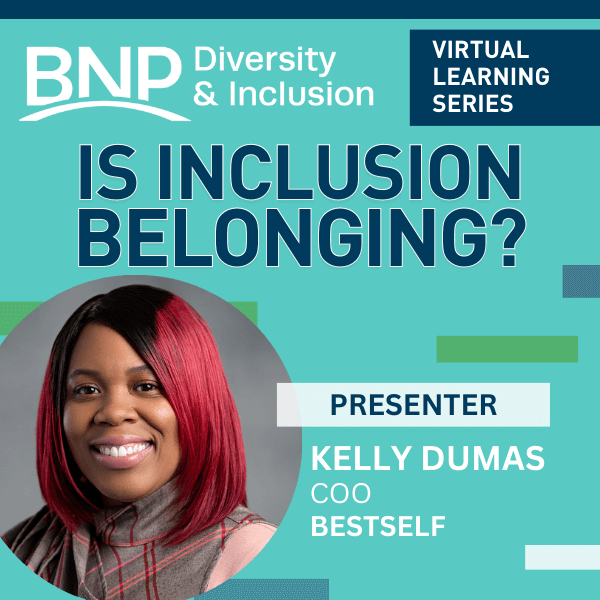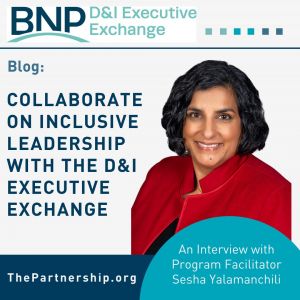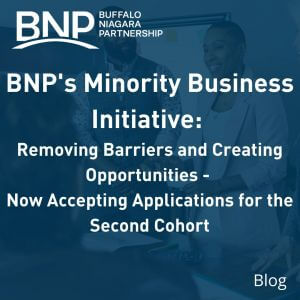Inclusion Is Not Synonymous With Belonging
Blog Categories
March 22, 2023
If you have ever wondered, Isn’t inclusion the same as belonging?, you are not alone. So often we hear these words and think of them as interchangeable terms to describe the same thing. You might be surprised to learn that have different meanings.
Kelly Dumas, COO at BestSelf Behavioral Health, will join us during Buffalo Niagara Partnership’s D&I Virtual Learning Series starting April 18, to help us to answer the question, “Is Inclusion Belonging?”
Here are some brief definitions to help clarify the meanings of inclusion and belonging:
- Inclusion ensures the thoughts, ideas, and perspectives of all people matter, as demonstrated through the actions and behaviors displayed in the workplace.
- Belonging is about an individual’s feelings of acceptance and a sense of being valued for who they are as distinct individuals and the contributions that they make toward enhancing the workplace, as a result of their integrated perspectives.
For instance, an employee may have been included in a team project. However, if every idea the employee shares is unilaterally dismissed without discussion or consideration, then inclusion has not taken place in this scenario. As a result of this type of treatment from their co-workers, it is likely that the employee also will not have a feeling of belonging to the team.
It is vitally important that inclusive practices are engaged in at every level of the organization. Senior leadership, middle managers, and front-line staff must all work to create a culture of inclusion by really valuing the ideas, contributions, and perspectives of everyone - especially those that are different from themselves. When companies can create this type of atmosphere, then the probability of employees experiencing a sense of belonging will increase. DEI executive Daisy Auger-Domínguez, author of Inclusion Revolution asserts that "you can create a sense of psychological safety where everyone feels confident and comfortable to take risks, make mistakes, contribute opinions, and be candid about what they are up against."
In the upcoming Virtual Learning Series with Kelly Dumas, you can expect to learn more about:
- Differences between inclusion and belonging
- Innovative ways to create a culture of belonging
- Tools to gauge your level of inclusion and belonging as a leader
- Resources to plan and level up your belonging culture and help you define what belonging looks like for those you lead
According to research on workplace belonging released by BetterUp:
If workers feel like they belong, companies reap substantial bottom-line benefits. High belonging was linked to a whopping 56% increase in job performance, a 50% drop in turnover risk, and a 75% reduction in sick days.
As the old saying goes, we truly are better together.

Related Posts
Statement from Dottie Gallagher, BNP President and CEO, regarding the Climate Action Council’s enactment of its final Scoping Plan:
(Buffalo, NY) “Over the next thirty years, when New Yorkers deal with rolling brownouts, skyrocketing energy costs, and mandates for expensive new appliances, they should remember today as the reason why.”
Expert Forum: Key questions employers should ask before choosing group health coverage
Several studies underscore the cost of poor health on worker productivity, including a 2018 study by the Integrated Benefits Institute which found costs related to lost productivity from illness amounts to $530 billion annually, or 60 cents for every dollar employers spend on health coverage.
Collaborate on inclusive leadership with the D&I Executive Exchange
The BNP’s Diversity & Inclusion Executive Exchange provides a unique, peer-to-peer forum for leaders to collaboratively share skills and strategies in D&I practices. Designed specifically for senior leaders with the highest level of responsibility for D&I initiatives, the program is facilitated by our expert in residence Sesha Yalamanchili.
Cultural humility. The term may be unfamiliar, but it is a critical component to any organization’s diversity, equity, and inclusion efforts.
BNP’s Minority Business Initiative: Removing Barriers and Creating Opportunities –
The Minority Owned Business Initiative (MBI) is entering its second year in 2023. This initiative seeks to help break through the barriers that have historically challenged minority business ownership and create a pathway to board membership for participants.




